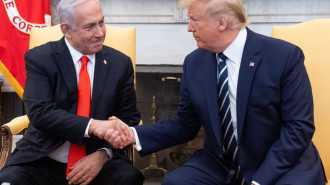Breadcrumb
Malaysia rolls out red carpet for Qatar's Sheikh Tamim
Sheikh Tamim, who arrived in Kuala Lumpur late on Sunday, was given a 21-gun salute at a state welcoming ceremony in Parliament. He also inspected a guard-of-honour during the ceremony, attended by Malaysia's king, Prime Minister Najib Razak and cabinet ministers.
The emir's visit is his second trip abroad since the Saudi-led diplomatic crisis and blockade erupted in June. He traveled to Turkey, Germany, France and the United States in September.
His visit to Malaysia comes eight months after Saudi Arabia's King Salman visited, the first trip to the Southeast Asian country by a Saudi king in more than a decade.
The Gulf crisis puts predominantly Muslim Malaysia in a tight spot because it is close to both Qatar and Saudi Arabia. Najib in July backed Kuwait's effort to mediate the crisis and called for a swift solution.
"We pray that all differences among our Arab brothers will be settled amicably and that the unity and harmony of the [Gulf Cooperation Council] countries can be restored," he said in a statement.
Malaysia's foreign ministry said it was the first visit by a ruling Qatari emir since Shekih Tamim's father visited Malaysia in 2009. It said the visit would provide an opportunity for the leaders to discuss bilateral issues and exchange views on issues of common interest.
Sheikh Tamim is scheduled to meet Najib and Malaysia's king, followed by a state banquet at the palace before leaving late on Monday.
Qatar is Malaysia's 40th largest trading partner, with total trade of $566 million in 2016.
Bahrain, Egypt, Saudi Arabia and the UAE began their boycott of Qatar on June 5. Mediation efforts by Kuwait, the US and others so far have failed to resolve the diplomatic crisis, the worst to hit the Gulf since Iraq's 1990 invasion of Kuwait.
When Qatar's sole land border with Saudi Arabia was closed and sea traffic cut off by the boycott, the World Cup organisers were forced to instigate a "Plan B" including bringing in supplies from Turkey.
Qatari authorities have said their efforts at building stadiums and infrastructure for the tournament, the first to be held in the Mideast, remain on track.






![Anthony Blinken speech [Getty] Anthony Blinken speech [Getty]](/sites/default/files/styles/image_684x385/public/media/images/6263436E-8ACD-4D3C-9055-25A7BE79DD5A.jpg?h=d1cb525d&itok=fLHmHCRG)
 Follow the Middle East's top stories in English at The New Arab on Google News
Follow the Middle East's top stories in English at The New Arab on Google News


![Many are vowing to boycott a film starring Amy Schumer, set to release next month [Getty]](/sites/default/files/styles/image_330x185/public/2152810030.jpeg?h=a5f2f23a&itok=wMRYjbOK)